Lithuanian Playing Cards
During the 20th century Lithuanian printers produced striking playing cards containing Lithuanian symbols and national heroes.

Playing Cards from Lithuania
Lietuvos Lošimo Kortos
Lithuania is the largest and most southerly of the three Baltic republics. The history of Lithuania has close ties with that of Poland, its neighbour to the southwest. By the end of the 18th century most of the country came under the Russian empire. During the periods of Soviet rule, Lithuanians relied on Catholic tradition and memories of independence to preserve their national identity, a skill mastered through centuries of foreign domination. Pagan traditions with roots stretching back centuries have been kept alive too.
The independent Lithuanian state was reestablished in 1918. After World War II the printing industry was nationalized by the Soviet administration.

During the short period of independence (c.1920-1940) Lithuanian printers produced some striking playing card designs in a range of artistic styles. Their unique artwork depicts national heroes, folklore and symbolism, evoking Lithuania's political history and struggle for national identity. Chief amongst these manufacturers was the Spindulys Printing Company (Aktiengesellschaft Spindulys, Kaunas, founded in 1928) which at one time also housed the national mint.
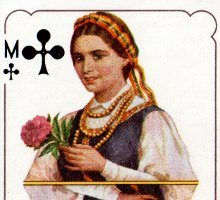
Above: Historical Playing Cards by Spindulys, c.1930 see more →
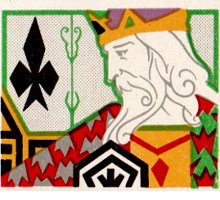
Above: Klubams by Spindulys Printing House, c.1930 see more →
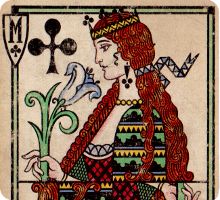
Above: Lithuanian Vaivorykštė playing cards see more →
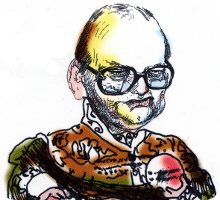
Above: Lithuanian ‘Gironda’ Political Playing Cards see more →
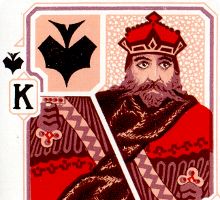
Above: Gedimino Stulpai by Spindulys Printing House, c.1930 see more →
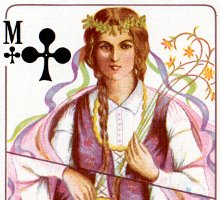
Above: Kunigaiksciai by Spindulys Printing House, c.1930 see more →
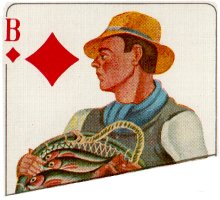
Above: Pilys, Lithuanian Castles Playing Cards see more →
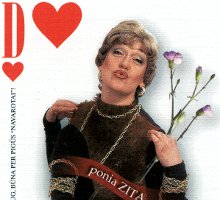
Above: Dviracio Kortos, Lithuanian Satirical Playing Cards see more →
Spindulys Printing House, 1928 - present
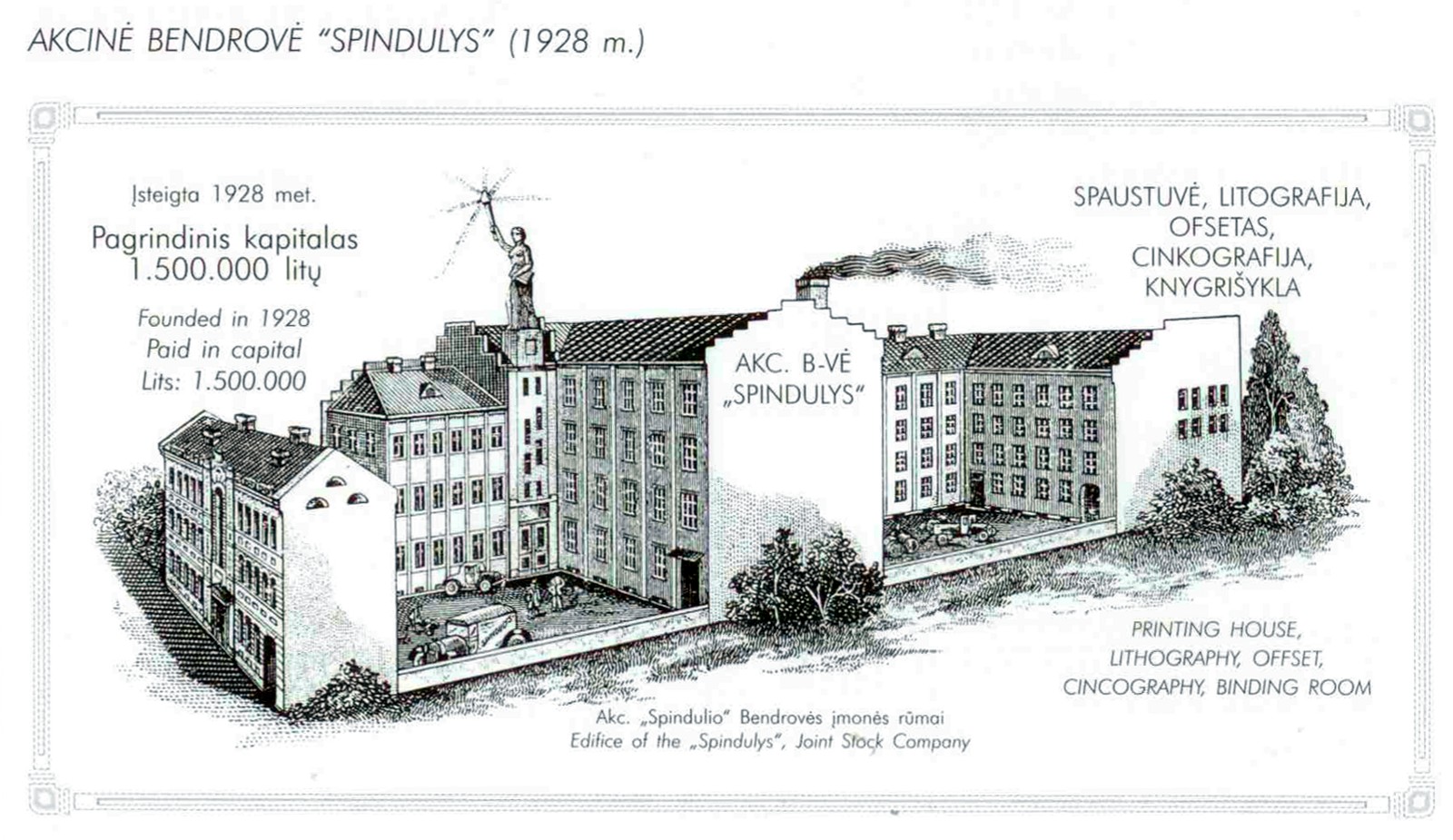
Above: Spindulys Printing House, Kaunas, founded in 1928 (Click image to enlarge).
Spindulys was established after combining three printing houses, “Svyturis”, “Varpas” and “Raides”. The Print Works was located at Miško Gatvė 11, Kaunas district municipality LT-44321, Lithuania. At that time the playing-card designers were Mstislavas Dobužinskis (1875–1957) and Barbora Didžiokienė (1896 - 1976).
During this period, cards were taxed by means of a tax stamp on the Ace of Diamonds which reads: "Lietuvos Valstybes Monopolio Kortos" (Lithuania State Playing-card Monopoly). There was also a factory seal around the wrapped deck (click image below).

Today Spindulys Printing House is located at Vakarinis Aplinkkelis 24 as a book printing house, although playing cards are still a possibility.
The political changes that occurred in Lithuania since regaining independence in 1990 impacted on all spheres, media included. Censorship was lifted and state ownership of media abolished. Liberation of the print media began in the 1990s and Lithuania first entered the EuroVision Song Contest in 1994.

See also: Latvia :: Estonia :: Klubams :: Kunigaiksciai (Dukes) :: Gedimino Stulpai :: Istorines (Historical) :: Vaivorykste :: Pilys (Castles) :: Dviracio Kortos :: Gironda Political Cards
Acknowledgements: images of cards kindly contributed by Albinas Borisevičius. Information and images about Spindulys Printing House kindly supplied by Tadas Jurys. The source of this Information is the book “Knyga ir likimai” (“Book and Fates”), Kaunas, 1998, printed in Lithuania (on the 70th anniversary of the printing house).

By Simon Wintle
Member since February 01, 1996
I am the founder of The World of Playing Cards (est. 1996), a website dedicated to the history, artistry and cultural significance of playing cards and tarot. Over the years I have researched various areas of the subject, acquired and traded collections and contributed as a committee member of the IPCS and graphics editor of The Playing-Card journal. Having lived in Chile, England, Wales, and now Spain, these experiences have shaped my work and passion for playing cards. Amongst my achievements is producing a limited-edition replica of a 17th-century English pack using woodblocks and stencils—a labour of love. Today, the World of Playing Cards is a global collaborative project, with my son Adam serving as the technical driving force behind its development. His innovative efforts have helped shape the site into the thriving hub it is today. You are warmly invited to become a contributor and share your enthusiasm.
Related Articles

Four Races
“Four Races” playing cards designed by Latvian artist Vilnis Rasa in 1989.

Lithuanian
Lithuanian Playing Cards, reprinted by Piatnik, 1995, 2004.

Lithuanian Playing Cards
During the 20th century Lithuanian printers produced striking playing cards containing Lithuanian sy...

Pilys
'Pilys' playing cards ('Castles') manufactured in Lithuania by Spindulys Printing House, Kaunas, c.1...

Vaivorykste (The Rainbow)
Vaivorykštė ('the Rainbow') playing cards manufactured in Lithuania by Spindulys, 1930s. The deck ha...

Istorinės
Istorinės Historical Deck from Lithuania manufactured by Spindulys Playing Card Manufactory, Kaunas,...

Gedimino Stulpai
Gedimino Stulpai playing cards made in Lithuania by Spindulys Printing Co., Kaunas, depicting Lithua...

Kunigaiksciai
Kunigaiksciai ('Dukes') playing cards published by Spindulys Printing Co., Kaunas, Lithuania during ...

Klubams
Klubams (for the clubs) playing cards manufactured in Lithuania by Spindulys Printing House (Kaunas)...

Gironda
8 cards and two jokers from the 'Gironda' pack, showing eminent statesmen and politicians from Lithu...

Dviracio Kortos, 2001
Dviracio Kortos playing cards, based on 'Dviracio Zynios' ('The Bicycle's News'), a popular Lithuani...
Most Popular
Our top articles from the past 28 days

